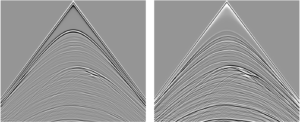This paper introduces DeepWave, a novel software stack, and methodology designed to integrate generative artificial intelligence into traditional seismic surveying techniques, significantly enhancing the computational efficiency of geophysical exploration. By utilizing advanced machine learning frameworks such as JAX, FLAX, and ALPA, DeepWave employs a parallelization strategy for image-to-image translation networks, optimizing the seismic data interpretation process. DeepWave reduces the computational demands of intensive geophysical algorithms, such as Full-waveform Inversion (FWI), while maintaining the accuracy required for detailed subsurface analysis. This method enables faster and more efficient processing of large seismic datasets, providing deeper insights into the Earth’s subsurface structures with reduced computational resources. The results demonstrate a substantial improvement in processing speed and resource management, establishing a new geophysical research and exploration standard.

A. Pinto, G. Leite, M. Pereira, H. Yviquel, S. Rigo and G. Araujo, “DeepWave: A Software Stack for Parallelizing Deep Learning Models Used in Geophysics,” 2024 IEEE 36th International Symposium on Computer Architecture and High Performance Computing (SBAC-PAD), Hilo, HI, USA, 2024, pp. 49-58, doi: 10.1109/SBAC-PAD63648.2024.00013.

